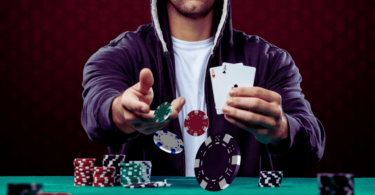Thinking Like a Poker Player in Uncertain Environments
Why Top Poker Players Make Great Traders
How Poker Skills Can Improve Your Trading Decisions
What Psychological Tricks and Hacks are Useful to Know?
10 Quotes to Inspire Your Trading Day
6 Productivity Tips from People Who Get Stuff Done
Your Guide to Managing Risk Like a Pro
The Business World’s Most Unbelievable Bets
5 Unusual Hobbies That Helped Top Traders Succeed
4 Unusual Assets You Never Knew Were Traded
Top Ten Trading Errors To Avoid: As Told By Traders
Could Astrology Make You A More Effective Trader?
Think Like a Trader
Do you Know What You Know
Expectancy
Money, Banking and the Federal Reserve
Gambling on Derivatives
5 Reasons The Online Casino Industry Is Booming
Financial Planning and the Lottery Effect: How Dreams...
Category - Trading or Gambling
Trading or Gambling
Fortunately, none of us serious trader types ever really gamble. We all take our trading very seriously, like a serious business person should, when they’re being serious about their business. Oh, sure, sometimes we might take a low probability position like buying a Gold call every now and then, but it’s not gambling. We’re far too serious and far too businesslike (oh, and serious, too) for that. After all, trading is a serious business and we treat it accordingly.
Some of you may now have an inkling of where I’m going with this…
Conservatism is not the opposite of risk-taking. Everyone on the face of the earth is a risk taker unless they’re dead, and maybe even then (but I can’t prove it). Every time you venture out of your house, you’re risking your life. Every time you don’t leave your house, you’re risking your life. Tornadoes, earthquakes, drive-by shootings, house fires, deadly viruses and bacteria; the world is just not a safe place. Sure, we’ll all die someday anyway, but pay no attention to the man behind the curtain because fatalism will harm you as a trader. Most of the time for most people, the risks that are assumed and taken minute to minute are small enough that we don’t really even think about them. Yeah, an airplane might fall out of the sky and hit us, but probably not. It’s not something that gets above the worry threshold.
“The line between investing and speculation or gambling in financial markets is always a pretty gray one,” he says. “And speculation is always a motive.”
“But Stiiiicks,” you complain, “you’re missing the point. Risking and gambling are different. I control risk in my serious business of trading. Actually, it’s that serious, businesslike attitude that separates me from the gamblers. I mean, I’m cautious and careful, not like those frivolous, arm-pulling, dice-throwing, chain-smoking out of control monsters in those Vegas casinos. I’m a speculator… no, an INVESTOR. I even keep my tie on when I do my end-of-day analysis. I control risk, therefore I do not gamble.”
Well, guess again. Yes, we most certainly are gamblers. Let’s start with a dictionary definition. This one is from the 1981 American Heritage Dictionary:
1.a. To bet money on the outcome of a game, contest or other event.
2. To take a risk in the hope of gaining an advantage; speculate.
1. (v -tr) To expose to hazard; to risk.
This, my friends, is dead on target. Trading is most definitely gambling. You buy or sell an option or a contract because you have a belief that the market is going to behave a certain way. I don’t care how confident or arrogant you are about your methodology, you do NOT have tomorrow’s paper and you do NOT know for certain which way the market will go. You are therefore making a bet on the market. You may as well just call up your broker and tell him, “Five hundred bucks says Corn goes up next week.” The only difference is that your broker does not say, “You’re on,” and take the other side of your bet. Another gambler in the market does that. The broker is the bookie.
Sure, you are “allocating margin”, or “purchasing an option”, but fundamentally you are betting money on the uncertain outcome of an event (that being the trading that takes place at the exchange).
Oooh… and there’s that word, “speculate”. Guess you really will have to be an “investor” after all, since speculate and gamble are synonyms. In futures? I think NOT. You’re not investing; the difference is subtle but significant. When you invest, you allocate or transfer assets and capital to a venture or entity such that it will prosper (partly as a result of your allocation), thereby increasing the value of the assets you provided. In futures trading, the only money you put down is earnest money to secure your position with the exchange, and it goes nowhere. It benefits no other entity. If you sell some Wheat contracts, the money doesn’t go to wheat farmers to help make their crops better, though that’s kind of an interesting thought (and I guess the long traders’ margin money would go to people who would try to sabotage the wheat crop). Same as if you took your £500 and put it on double-threes; that money goes nowhere but onto the exchange… sorry, the table, and you get it back plus a little if you win.
So we’re reduced to being *ugh* gamblers. How depressing.
Actually, not really. This “investor, speculator, gambler” thing is really just an IYOUHE game. I YOU HE. I am creative. YOU are eccentric. HE is an acid-tripping lunatic. See how that works? I am an investor. YOU are a speculator. HE is a gambler. But let’s take it down a step further. You get an unhappy feeling when I tell you that you’re a gambler. Why? Why is that bad?
What it is, I think, is that a “gambler” is considered to be someone who takes foolish risks without thought, and who is out of control when it comes to money. This is totally wrong. A gambler is just someone who takes risks with money, nothing more. There are a lot of people in Vegas who lose everything they brought to town, even if they went way up before blowing out. There are a lot of people in Vegas who play the various games available without consideration for their chances of success at each one, and without a specific goal in mind. For those who were just there on a vacation, this isn’t necessarily a bad thing. For those who went there with the plan or the need to win, this is pretty unfortunate. It’s also unfortunate to see folks trading… sorry, betting, and getting into losses way over their head that they hadn’t planned on and can’t quite afford.
But there are also people who gamble in Vegas who have a risk management plan. They lose small amounts and then stop. They win and pull part of their profits so they make sure they have something to take home. They win for a while, and then stop when the market… sorry, the game starts to move against them. There are also people who gamble successfully for a living. Not too many of them, but they play only specific games with a very specific plan, and treat the entire endeavor (the play, the risk management, the profit management) as a business. It is a business for them; it’s the methodical and studied attempt to accumulate income.
In trading, it’s the same thing. I went to Vegas once in 1997 (sue me, sitting in smoke filled rooms isn’t my thing). I was absolutely blown away at the similarities between playing craps, roulette (heaven help you), slots, etc. and trading. Everybody’s got a system, but very few of them are sensible — at least, very few of them are sensibly and consistently implemented. People talk about luck, about risk and reward, about the huge amount somebody made once, about the big losses somebody had once. Folks win a little, lose a little. Everybody dreams about an absolute killing, and next to nobody gets one. Most folks seem to lose what they came with, but not way more than that. Emotion reigns as king; every sizeable win yields a victory dance and flashing lights, and every long draw-down and big loss produces despair. I played quarter slots. I started with a fixed maximum loss, and as the position increased (it was a Saturday evening, on a machine near but not right at the entrance…) I set a trailing stop on the amount of money in the machine. I got as high as £475 ahead, but when the trailing stop at £300 got hit, I cashed out. Nice trade; nothing to write home about, but a decent return on quarter slots. Over the next couple of days, I won a little more and then lost steadily. When I got down to £200 ahead on the trip, I stopped and watched everybody else lose money for the duration. Same as being wrong about the same market too often, so you give up and go somewhere else for a while until the market behavior changes.
Some people trade willy nilly, taking positions without a lot of thought. Buy 100 far-away Gold calls; the end of the world is near. Wait three months until they expire worthless. Re-fund the account. Repeat. That kind of thing. Other people make the same mistakes again and again. Take a position that’s too big. Lose too much. Repeat. A few people treat it like a business, whether on the side or for their primary income. They manage risk, have a specific plan, play only those markets that fit the plan, and manage profits. They’re still gambling, but they’re doing it in a professional and businesslike manner.
So what’s the point of all of this? I have a belief that you should aggressively ferret out B.S. in your trading life, whether you bought it from somebody else or you made it up yourself. If you’re spending a lot of time constructing an alternate reality for yourself so that you can justify, deny or otherwise ignore what you are doing, STOP. Who knows what else is creeping into that reality? It will only interfere with your ability to do real trading in the real world. You are gambling if you trade. Say it to yourself. If it makes you feel bad or unclean, either stop trading or undo that bad feeling. You’ve got a lot of good company if you’re a gambler; every highly successful business person in the world is a proficient gambler. Everyone who takes a public stand based on their convictions is a gambler. If you recognize the risk-taker inside of you and can give him or her a friendly nod, you might end up re-balancing your trading effort a little. Give it a try!
The Dow is Down
(Parody of I’m Goin’ Down by Bruce Springsteen)
I get a bear when I’m clickin’ my mouse
But now I hate to see that ticker comin’ round
I go to check the Dow and Nasdaq baby
They’re dropping points Like Jenny Craig’s droppin’ pounds..Well
Say unemployment’s not on the rise
But Cisco just laid off a thousand guys
It’s going down down down down
Dow Jones is down down down down
Nasdaq is down down down down
Everything’s down down down down
Touchdown!
(horn solo playing)
I used to have a nest egg baby
But now my golden years are all in Dow…well
I remember when the 90’s started
My stocks would split each time the sun come out.. well
I would day trade n’ dabble in margin
My portfolio was lookin’ stout…well
I used to love that Alan Greenspan
But lately everytime he speaks
He’s just a drivin’ the
Dow Jones down down
It’s goin’ down down down down
It won’t rebound bound bound bound
it’s stayin’ down down down down
the Dow is down down down down
The Nasdaq’s down down down down
Greenspan’s a clown clown clown clown
My stocks are down hey how about the deep down dow.
My Dow is down down down down
My stocks are down
hey how about the deep down dow
My money’s down down down down
The market’s down down down down
fade…hey bop bop bop



















